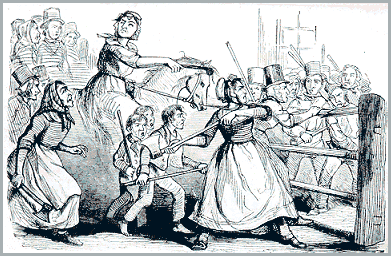Radicals in the Countryside: The Story of the Rebecca Riots
Posted by Pete on 6th Aug 2020
Nearly 200 years ago, outside the bustle of Britain’s industrial cities, the seemingly quiet Welsh countryside became a battleground in the fight against economic injustice.

It’s easy to think of the British countryside as a serene place.
From Cumbria’s calming lakesides to the silent mountain tops of the Scottish Highlands, stillness seems to reign.
But until at least the 19 th century, when the rural parts of the British Isles were still home to most of the population, the countryside was a place of chaos, hardship, and also rebellion.

In medieval times, Wat Tyler led the Peasants’ Revolt out of Kentish farmland and William Wallace raised his freedom fighters from the glens and forests of Scotland.
Still, centuries later, the countryside remained a hotbed of popular insurrection.
The Tolpuddle Martyrs, for instance, were arrested and deported in 1834 for forming a trade union of farm labourers in rural Dorset.
But their deportation didn’t put an end to political radicalism in the British countryside - far from it.
Only a few years later, the rural lanes of West and Mid Wales were consumed by a wave of radical protest known to history as the Rebecca Riots.
After years of agricultural downturn in the late-1830s, poor, Welsh tenant farmers were being crushed by falling prices for their produce.
But the government weren't offering any kind of relief. Various taxes and rents remained unchanged.
Discontent was brewing, and it soon found an obvious target.

Of the many exactions which the tenant farmers of early-19 th century Wales had to live with, the endless tollgates were the most galling.
Run by a group of unscrupulous trusts, the gates were unavoidable and made operating costs unbearable for small, Welsh farmers.
What’s more, the toll-gate revenue, which was supposed to be spent on maintaining and improving the roads, was often just pocketed.
This combination of economic hardship and official corruption pushed the Welsh tenant farmers to act.
In 1839, large groups of them began ambushing tollgates and burning them down.
All the while their leaders were dressed as women.
The reason behind this custom isn’t exactly clear. There was a wider Welsh tradition of social protest being led by men dressed as women but there was potentially a more specific connection to this movement against the tollgates.
It’s said that during the destruction of a tollgate, the protesters would chant this biblical verse:
Well into the 20 th century, Welsh radicalism has been expressed in Christian terms and here there was a clear Biblical link to be made with the farmers’ tollgate grievance.
So, the protestors weren’t dressing as any woman – but as Rebecca, hence the 'Rebecca Riots'.
The participants were also known as 'Merched Beca' in Welsh, or 'Rebecca’s Daughters'.
The Riots kept on until 1842, when they petered out as soldiers were sent in to repress them.
But two years later, the movement belatedly bore fruit when the government passed the South Wales Act – today in 1844 – simplifying rural rates, increasing regulation on the tollgate trusts and cutting the prices they were able to charge.
Rebecca’s Daughters had been heard.

The Rebecca Riots are a founding moment in the people’s history of modern Wales, but they were also just another step in a long and proud tradition of radical politics in the rural corners of the British Isles.
Beneath its apparent tranquillity, our countryside has a radical history as fiery and inspiring as our great towns and cities.
And this history didn’t stop with mass urbanisation.
From the Kinder Scout Trespass of 1932 to the 21st century campaigns against foxhunting, Britain’s rural, radical history is still ongoing.
So, as more of us head to the national beauty spots this summer, remember keep yourselves and those around you safe, but also spare a thought for the radical history that you’re travelling through!
